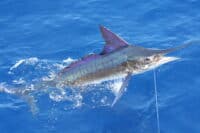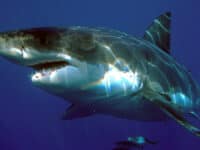
Suffering from allergies is bad enough, but being allergic to your dog is worse still. Dogs are our companions, playmates, and guardians, and sometimes they seem to care for us as much as we care for them. Dogs display affection and loyalty like just about no other pets, and they are repaid in kind. Many people even share their beds with their dogs. These are America’s most popular dog breeds.
So what are you to do if you are allergic to dog fur and want a dog? Fortunately, there are many breeds that are well suited to allergy sufferers, and 24/7 Tempo has compiled a list of them. To identify which dog breeds are best suited for allergy sufferers, 24/7 Tempo reviewed the American Kennel Club’s verified list of hypoallergenic dogs.
Dogs come in all different shapes and sizes. Of course, there are hairless breeds that don’t have hair to shed, but there are many breeds with hair that hardly shed at all.
Because even allergy sufferers have many breeds to choose from, other factors can come into play. Do you have a family? Do you prefer bigger or smaller dogs? Do you live in a city or in a rural area? And of course there are lots of good reasons for adopting a rescue dog.
To identify which dog breeds are best suited for allergy sufferers, 24/7 Tempo reviewed the American Kennel Club’s verified list of hypoallergenic dogs. All information related to each breed’s personality, trainability, shedding, size, and life expectancy comes from the AKC.
Click here to see the most allergy-friendly dog breeds.

1. Bedlington Terrier
> Size: 15-17.5 inches, 17-23 pounds
> Shedding: Infrequent
> Good with kids?: Better with supervision
> Trainability: Responds well
> Life expectancy: 11-16 years
The Bedlington is named after a mining district in England where it worked for a living killing rats and performing other tasks. Although the Bedlington requires weekly grooming, its distinctive, fleecy coat makes it a one-of-a-kind breed for owners who deal with allergies.
[in-text-ad]
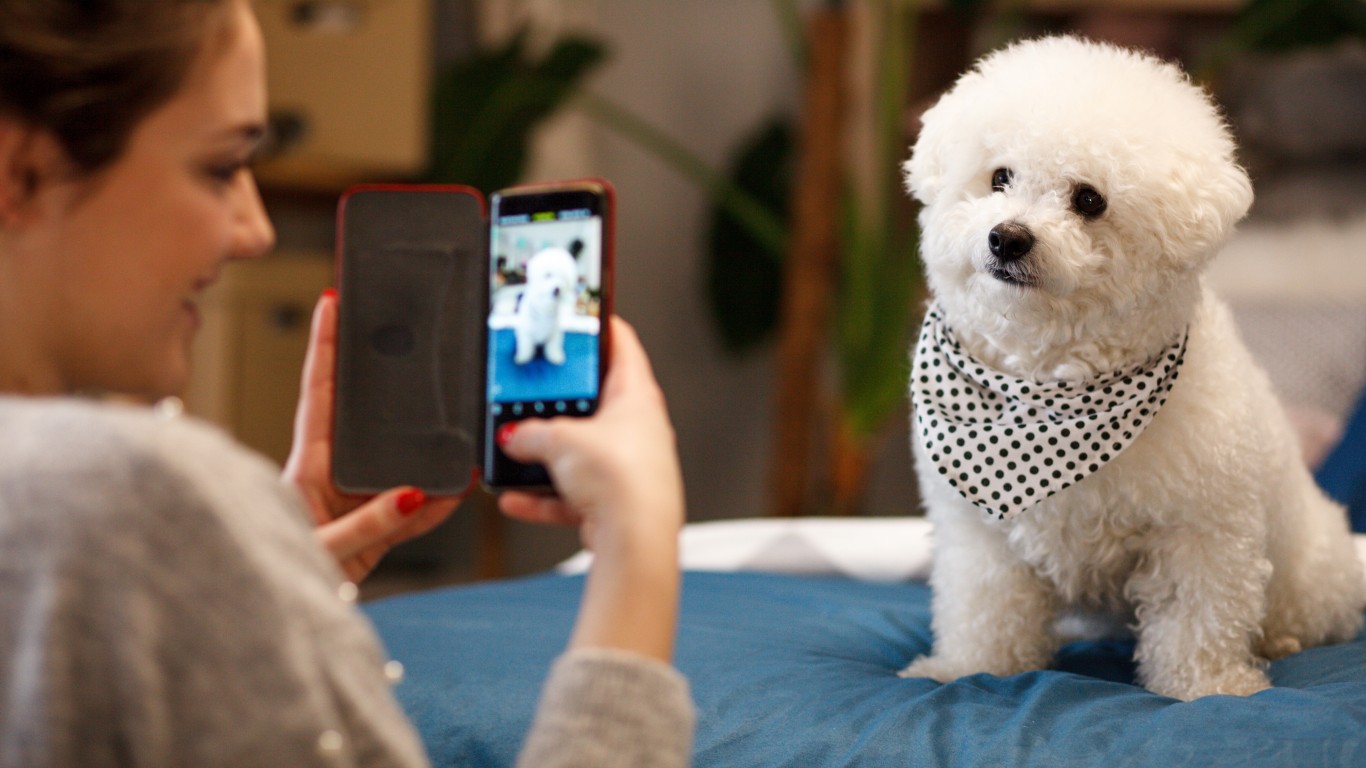
2. Bichon Frise
> Size: 9.5-11.5 inches, 12- 18 pounds
> Shedding: Infrequent
> Good with kids?: Yes
> Trainability: Responds well
> Life expectancy: 14-15 years
Bichon frise is a French name that translates into English as “curly dog.” This easily trained little dog is hypoallergenic, and rarely sheds. According to the American Kennel Club, the bichon frise makes a good companion for young children.
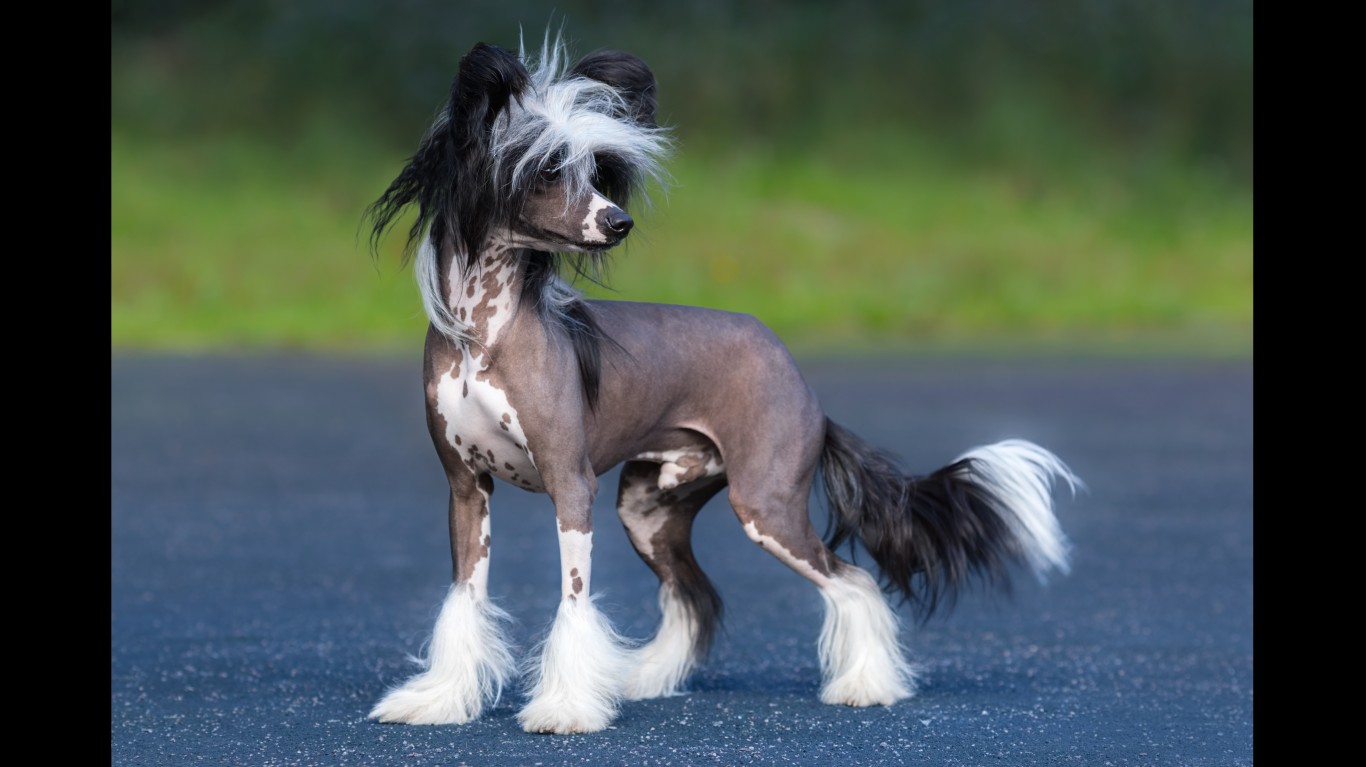
3. Chinese Crested
> Size: 11-13 inches, 8-12 pounds
> Shedding: Infrequent
> Good with kids?: Better with supervision
> Trainability: Responds well
> Life expectancy: 13-18 years
The Chinese crested has ancient origins that trace back to Africa via China. It can be coated or hairless and, like a cat, enjoys sitting in high places, according to the AKC.
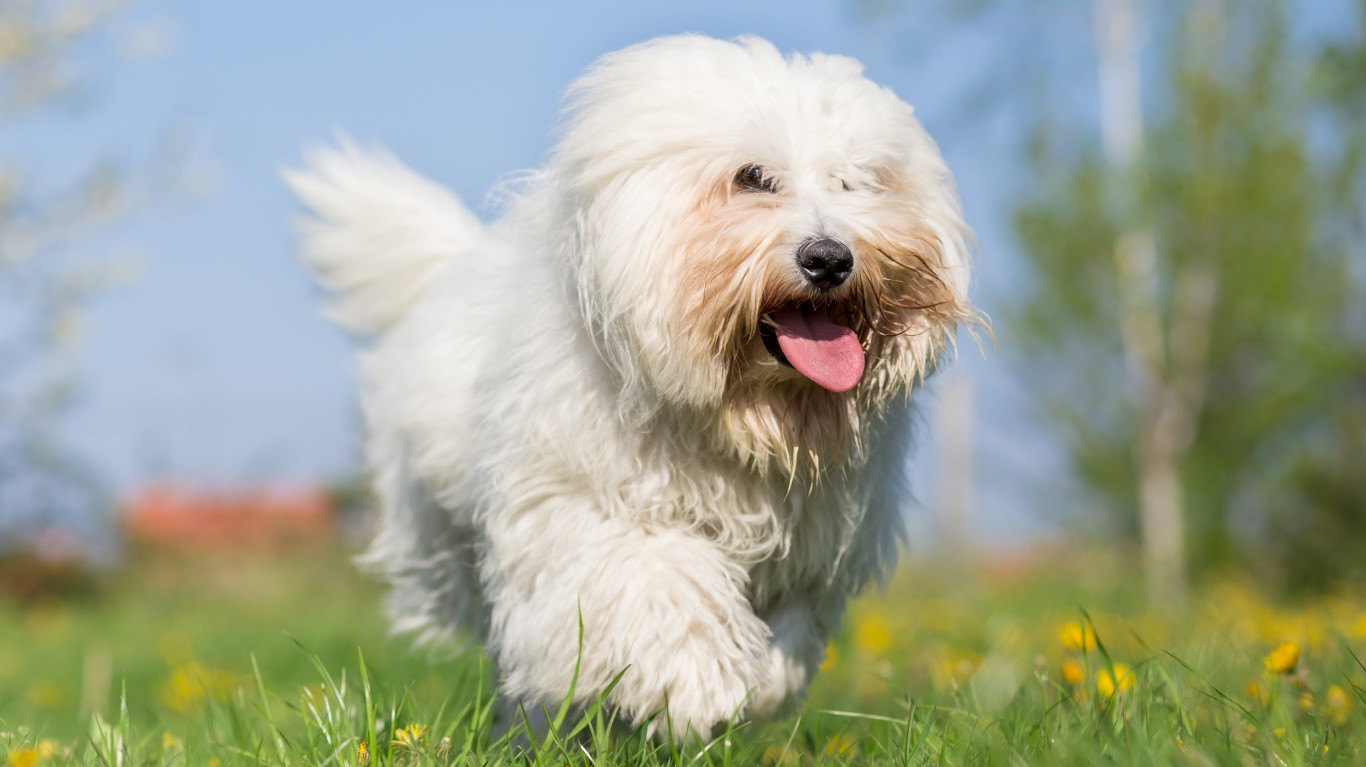
4. Coton de Tulear
> Size: 9-11 inches, 8-15 pounds
> Shedding: Seasonal
> Good with kids?: Yes
> Trainability: Responds well
> Life expectancy: 15-19 years
The coton de Tulear is known as the “Royal Dog of Madagascar.” It sheds very little and is distinguished by its long, soft coat that grows up to four inches. Coton is the French word for cotton.
[in-text-ad-2]

5. Irish Water Spaniel
> Size: 21-24 inches, 45-68 pounds
> Shedding: Seasonal
> Good with kids?: Better with supervision
> Trainability: Eager to please
> Life expectancy: 12-13 years
The tallest of the spaniels recognized by the AKC, the Irish water spaniel is distinguished by its curly, waterproof coat. It has yet to become a popular household choice in the United States.
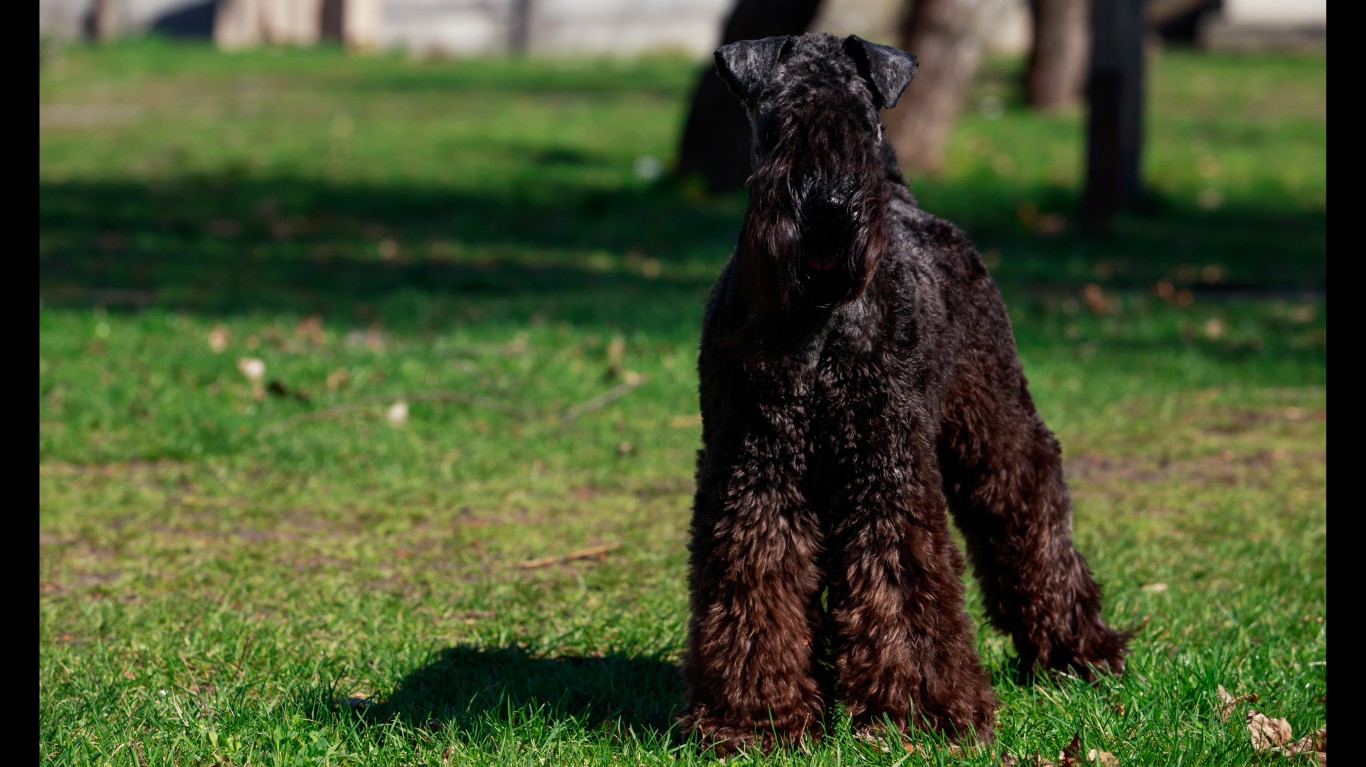
6. Kerry Blue Terrier
> Size: 17.5-19.5 inches, 33-40 pounds
> Shedding: Infrequent
> Good with kids?: Better with older children
> Trainability: Independent
> Life expectancy: 12-15 years
The Kerry blue terrier was originally bred to guard, herd, and hunt, but adapts well to apartment living. Intelligent and independent, the Kerry’s soft, wavy coat rarely sheds, making it a great hypoallergenic dog for any owner living in the city.
[in-text-ad]

7. Maltese
> Size: 8-10 inches, 6-8 pounds
> Shedding: Infrequent
> Good with kids?: Better with older children
> Trainability: Responds well
> Life expectancy: 12-15 years
With a very long coat of silky white hair, the Maltese needs to be groomed often in order to avoid knotting. Despite its dainty appearance, it has a reputation for being courageous and perky.
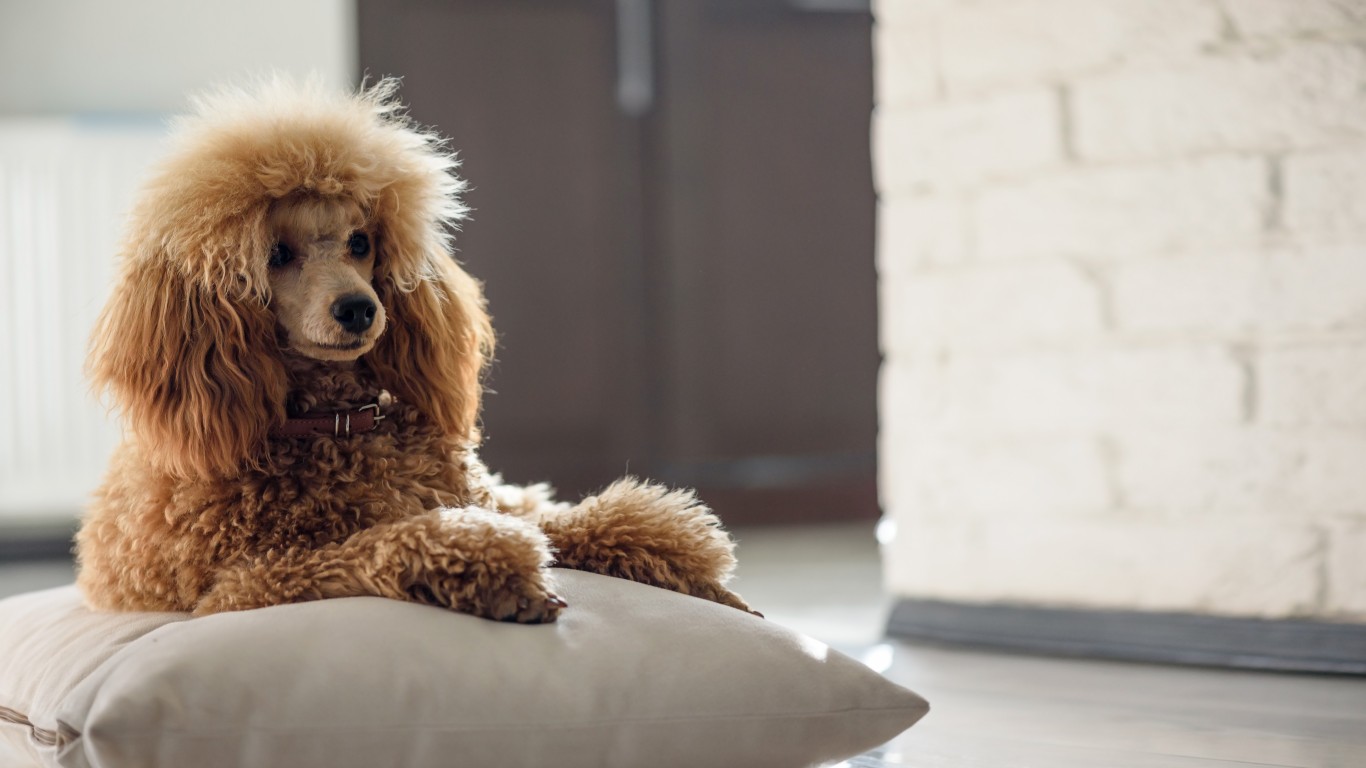
8. Poodle
> Size: <10-15 inches, 4-50 pounds
> Shedding: Infrequent
> Good with kids?: Yes
> Trainability: Eager to please
> Life expectancy: 10-18 years
There are three sizes of poodles: standard, miniature, and toy. It enjoys walking, running, and swimming, so if you’re the athletic type you may just want to invite your poodle along for the workout!
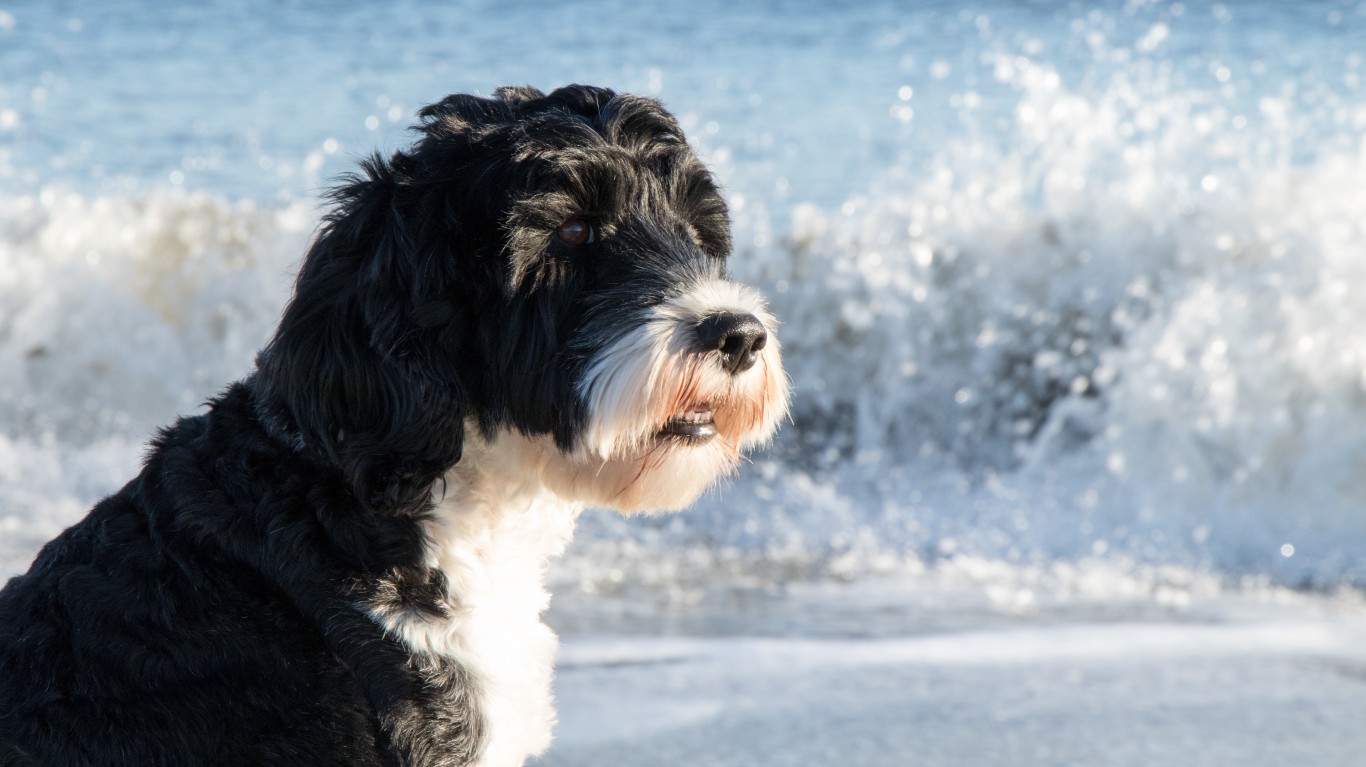
9. Portuguese Water Dog
> Size: 17-23 inches, 35-60 pounds
> Shedding: Seasonal
> Good with kids?: Yes
> Trainability: Eager to please
> Life expectancy: 11-13 years
The Portuguese water dog has the advantage of a waterproof coat. President Obama and his family chose a Portuguese water dog, Bo, as a pet because daughter Malia suffers from allergies.
[in-text-ad-2]
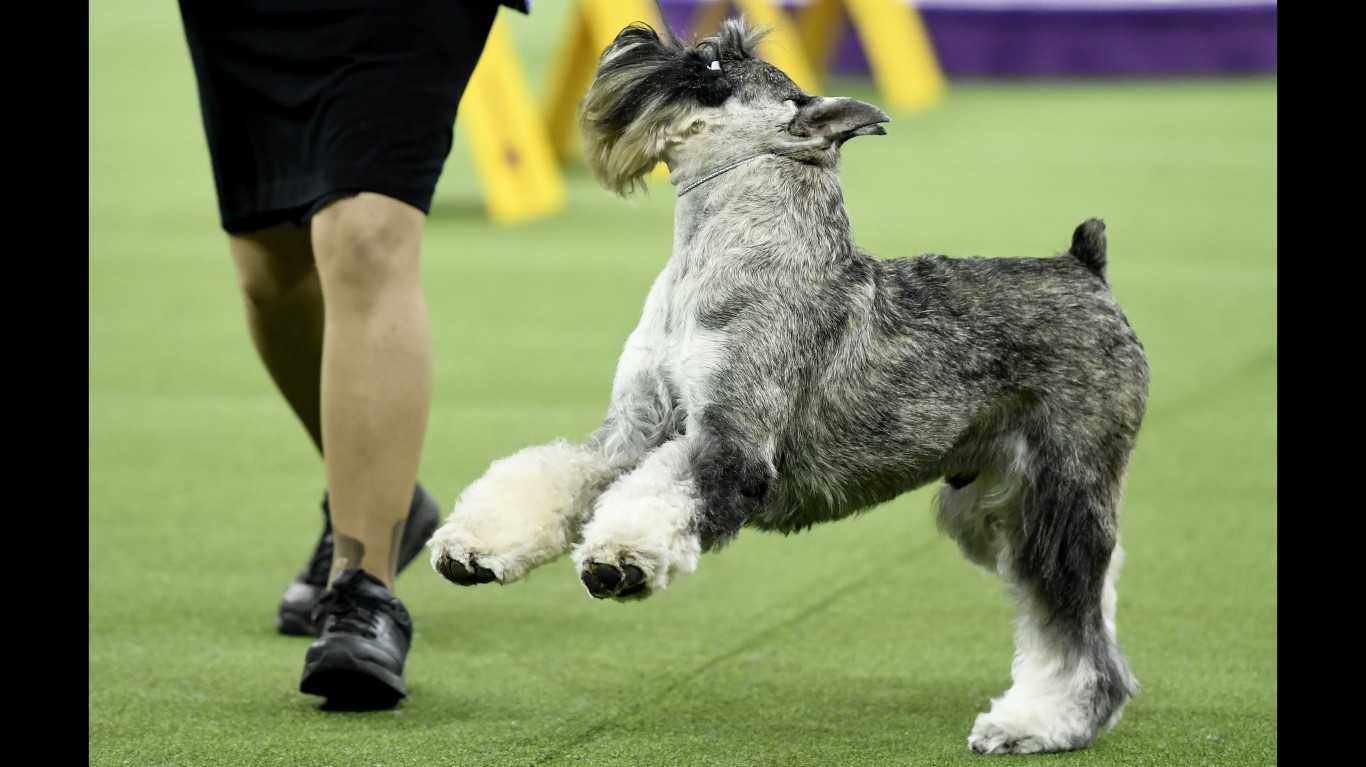
10. Standard Schnauzer
> Size: 17.5-19.5 inches, 30-50 pounds
> Shedding: Infrequent
> Good with kids?: Yes
> Trainability: Responds well
> Life expectancy: 13-16 years
This dog rarely sheds, which makes it a good choice for allergy sufferers. Just like any of the three types of schnauzers, this breed has a wiry, tight-fitting coat that keeps debris off. What’s dug up outside, stays outside.
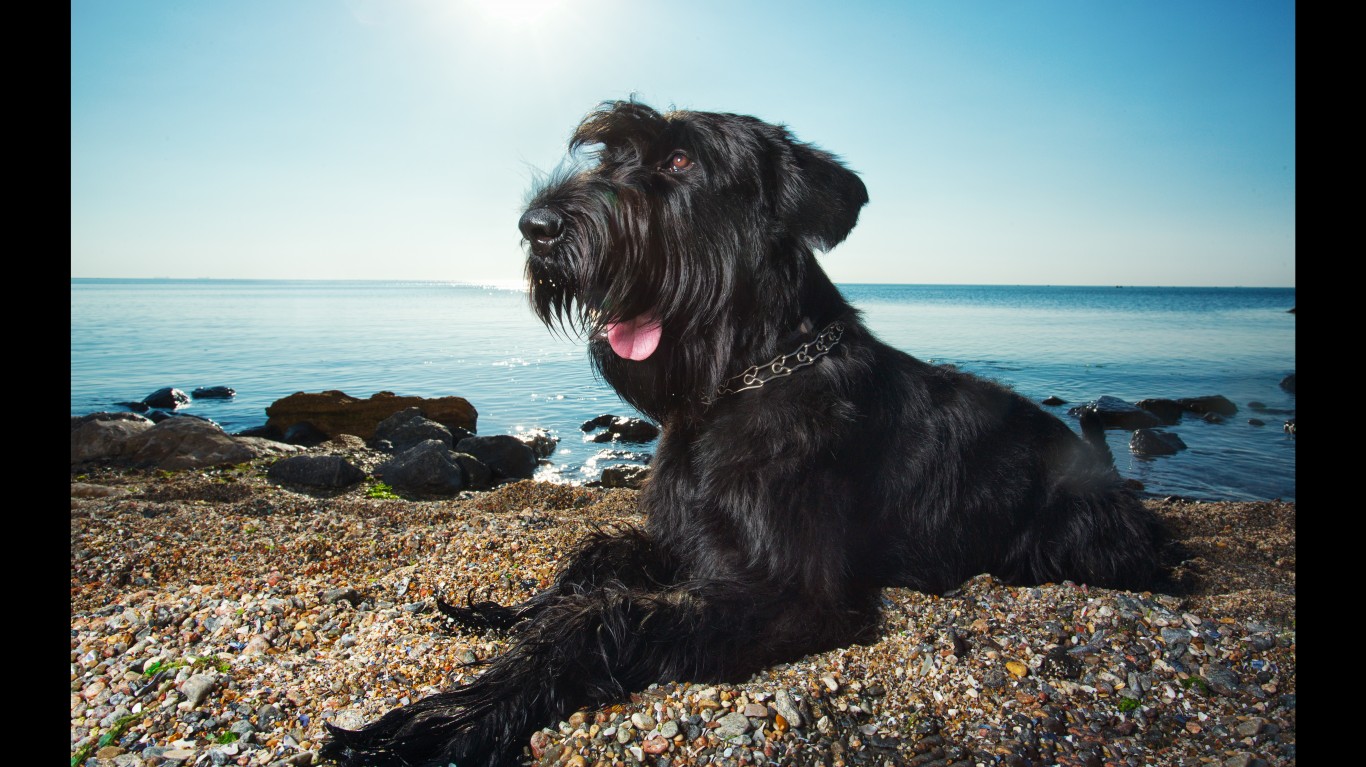
11. Giant Schnauzer
> Size: 23.5-27.5 inches, 55-85 pounds
> Shedding: Seasonal
> Good with kids?: Better with supervision
> Trainability: Eager to please
> Life expectancy: 12-15 years
The giant schnauzer is a powerful dog built for work and an active life. It’s also hypoallergenic.
[in-text-ad]
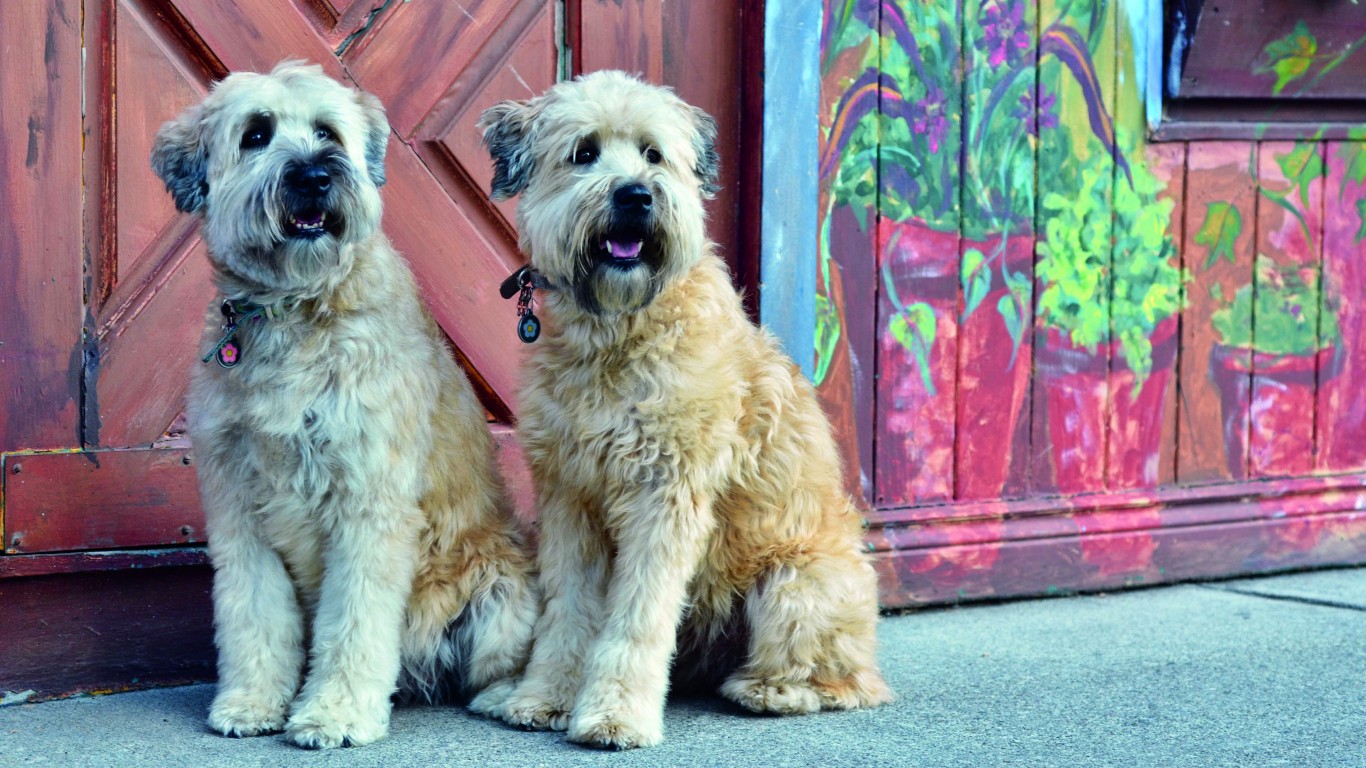
12. Soft Coated Wheaten Terrier
> Size: 17-19 inches, 30-40 pounds
> Shedding: Non-shedding
> Good with kids?: Better with supervision
> Trainability: Eager to please
> Life expectancy: 12-14 years
The soft coated wheaten terrier is set apart from other terriers by its silky coat. According to the AKC, it combines the alert intelligence of the terrier with the steadiness of the working dog.

13. Xoloitzcuintli
> Size: 10-23 inches, 10-55 pounds
> Shedding: Infrequent
> Good with kids?: Better with supervision
> Trainability: Responds well
> Life expectancy: 13-18 years
According to the AKC, the xoloitzcuintli is one of the world’s oldest and rarest breeds. The name comes from the Aztec god Xolotl, and the Aztec word for dog, Itzcuintli. In remote Mexican and Central American villages, this dog was used to ward off and cure ailments such as asthma, which should make it ideal for allergy sufferers.

14. American Hairless Terrier
> Size: 12-16 inches, 12-16 pounds
> Shedding: Infrequent
> Good with kids?: Yes
> Trainability: Eager to please
> Life expectancy: 14-16 years
Not only are American hairless terriers suitable companions for those with allergies, but they also train easily and get along with other pets..
[in-text-ad-2]

15. Lagotto Romagnolo
> Size: 16-19 inches, 24-35 pounds
> Shedding: Infrequent
> Good with kids?: Better with supervision
> Trainability: Eager to please
> Life expectancy: 15-17 years
The lagotto Romagnolo is an ancient breed that originated in Italy and its fur is quite similar to that of the Portuguese water dog. Despite its cute appearance and affectionate personality it is surprisingly rugged.

16. Afghan Hound
> Size: 25-27 inches, 50-60 pounds
> Shedding: Infrequent
> Good with kids?: Better with supervision
> Trainability: Independent
> Life expectancy: 12-18 years
The Afghan hound’s thick coat protected it from the elements in the mountainous regions of Afghanistan. This breed has huge paw pads that absorb impact, another physical attribute they developed over time because of the harsh environment.
[in-text-ad]
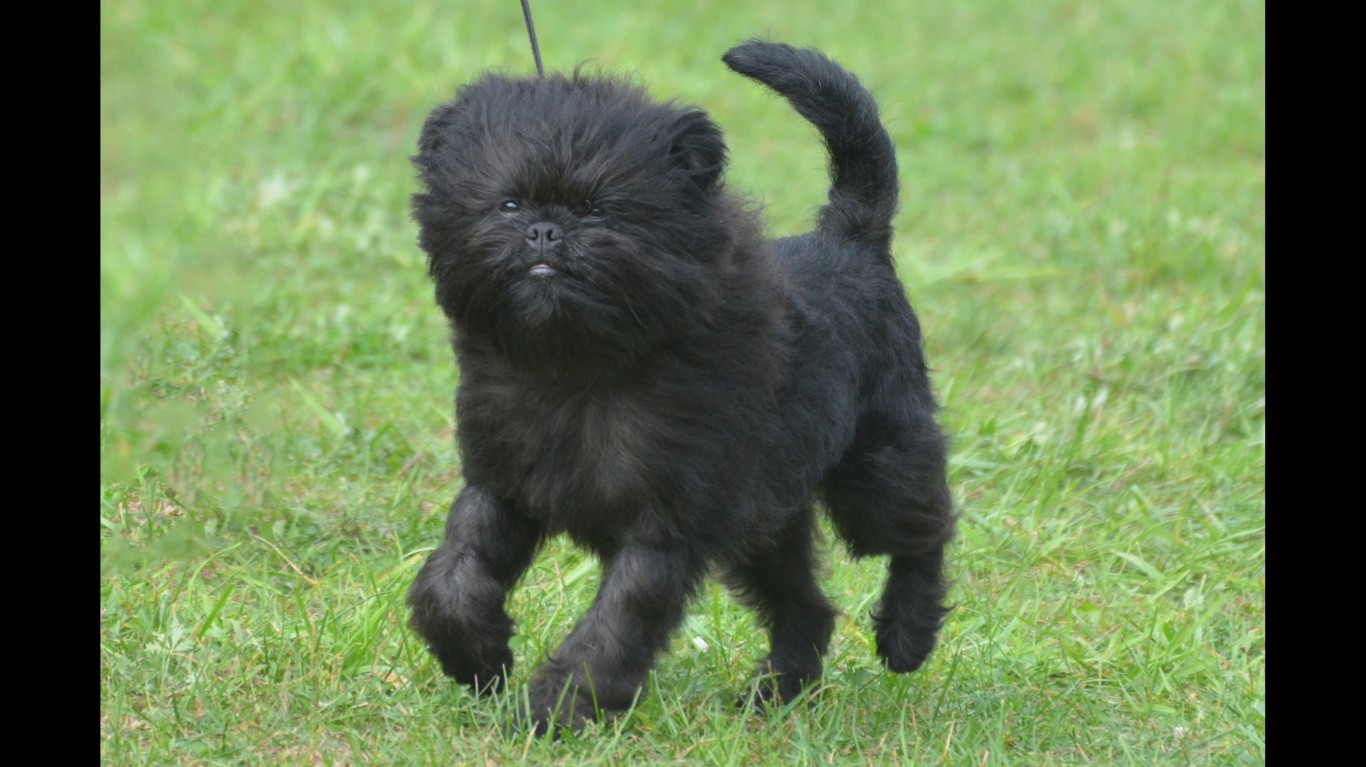
17. Affenpinscher
> Size: 9-11.5 inches, 7-10 pounds
> Shedding: Some shedding
> Good with kids?: Good
> Trainability: Reputation for being difficult
> Life expectancy: 12-15 years
The affenpinscher is of German origin â “affe” is the German for “monkey,” so the name literally means “monkey terrier.” While it looks like a terrier, the Affenpinscher actually belongs to the pinscher-schnauzer family.

18. Barbet
> Size: 19-24.5 inches, 35-65 pounds
> Shedding: Non-shedding
> Good with kids?: Good
> Trainability: Easy to train, responsive
> Life expectancy: 12-14 years
The barbet was originally a water dog and was used in France for hunting game. The barbet’s defining characteristic is its dense shaggy coat, which is non-allergenic and non-shedding.
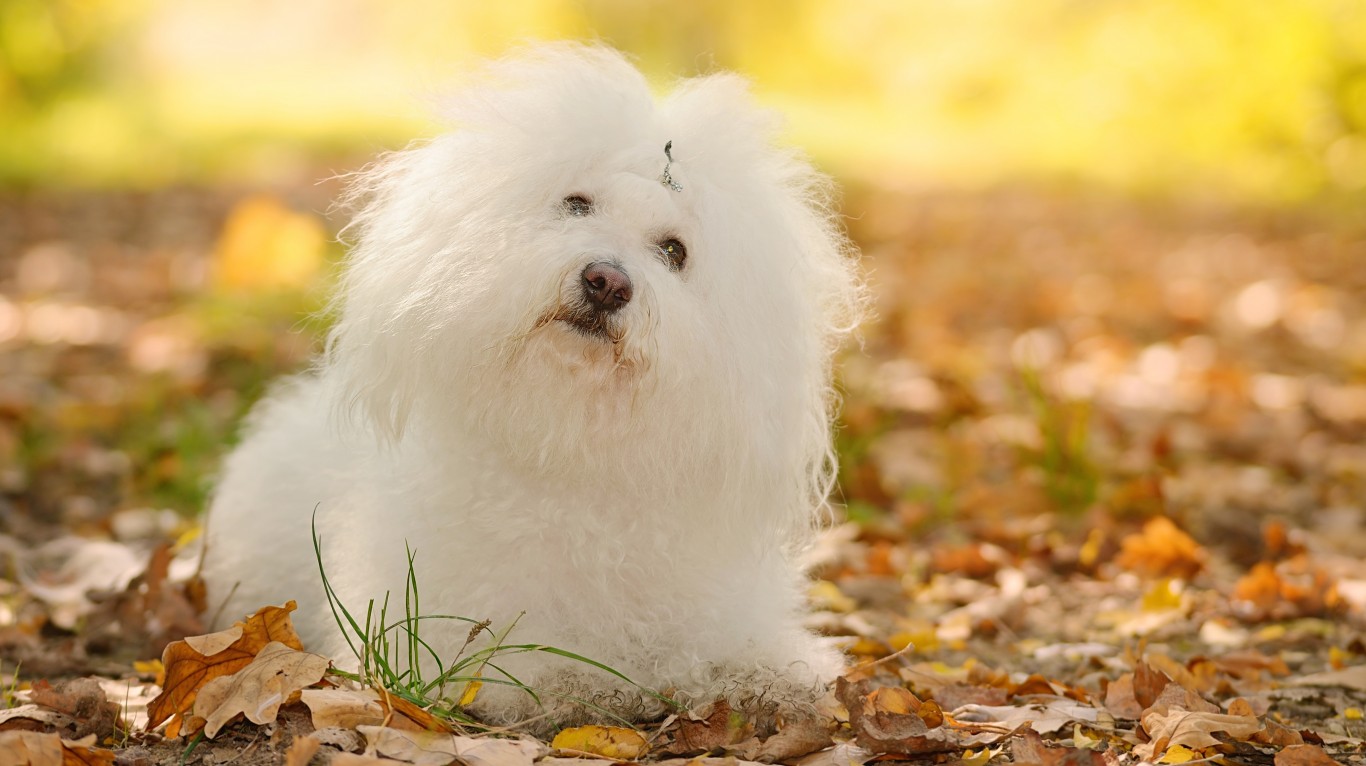
19. Bolognese
> Size: 10-12 inches, 5.5-9 pounds
> Shedding: Non-shedding
> Good with kids?: Good
> Trainability: Prone to “small dog” syndrome
> Life expectancy: 12-14 years
As its name suggests, the Bolognese was developed in Bologna, Italy, and dates back as much as 1,000 years. The Bolognese almost went extinct but was rescued by an Italian breeder and has been gaining in popularity since 1990.
[in-text-ad-2]
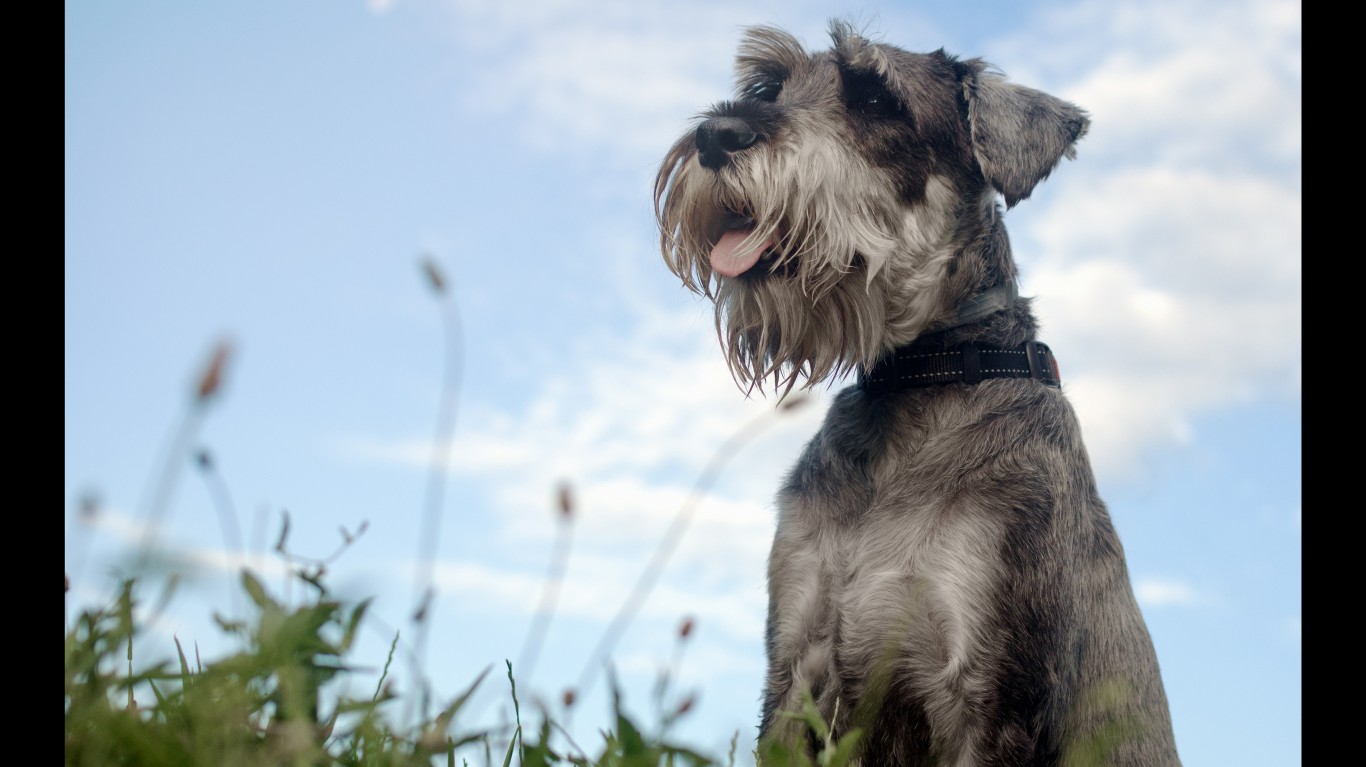
20. Miniature Schnauzer
> Size: 12-14 inches, 11-20 pounds
> Shedding: Little
> Good with kids?: Good
> Trainability: Eager to please
> Life expectancy: 12-15
In the United States, the miniature schnauzer is treated differently from other schnauzer breeds in that it is not classified as a working dog and is judged in competition as a terrier. It has a wiry double coat. It sheds very little and is safe for those with pet allergies.
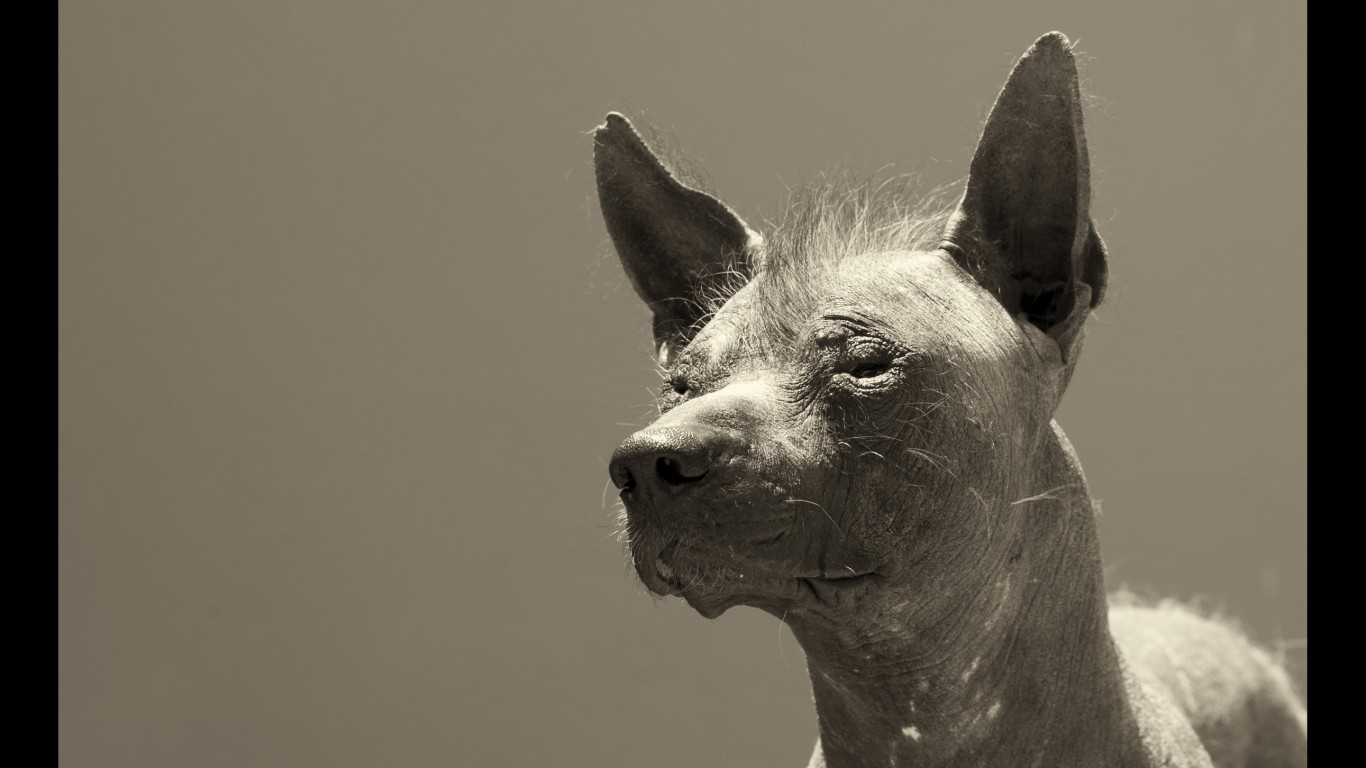
21. Peruvian Inca Orchid
> Size: 9.75-15.75 inches, 8.5-17.5 pounds (small); 15.75-19.75 inches, 17.5-26.5 pounds (medium); 19.75-25.75 inches, 26.5-55 pounds (large)
> Shedding: Little or none
> Good with kids?: Not good with small children
> Trainability: Need to be socialized
> Life expectancy: 12-14 years
The Peruvian Inca orchid is a slim sighthound and can be coated or, more often, hairless. It originated in Peru and has been increasingly gaining popularity elsewhere. The hairless variety is considered a good choice for allergy sufferers because, of course, it doesn’t shed.
[in-text-ad]
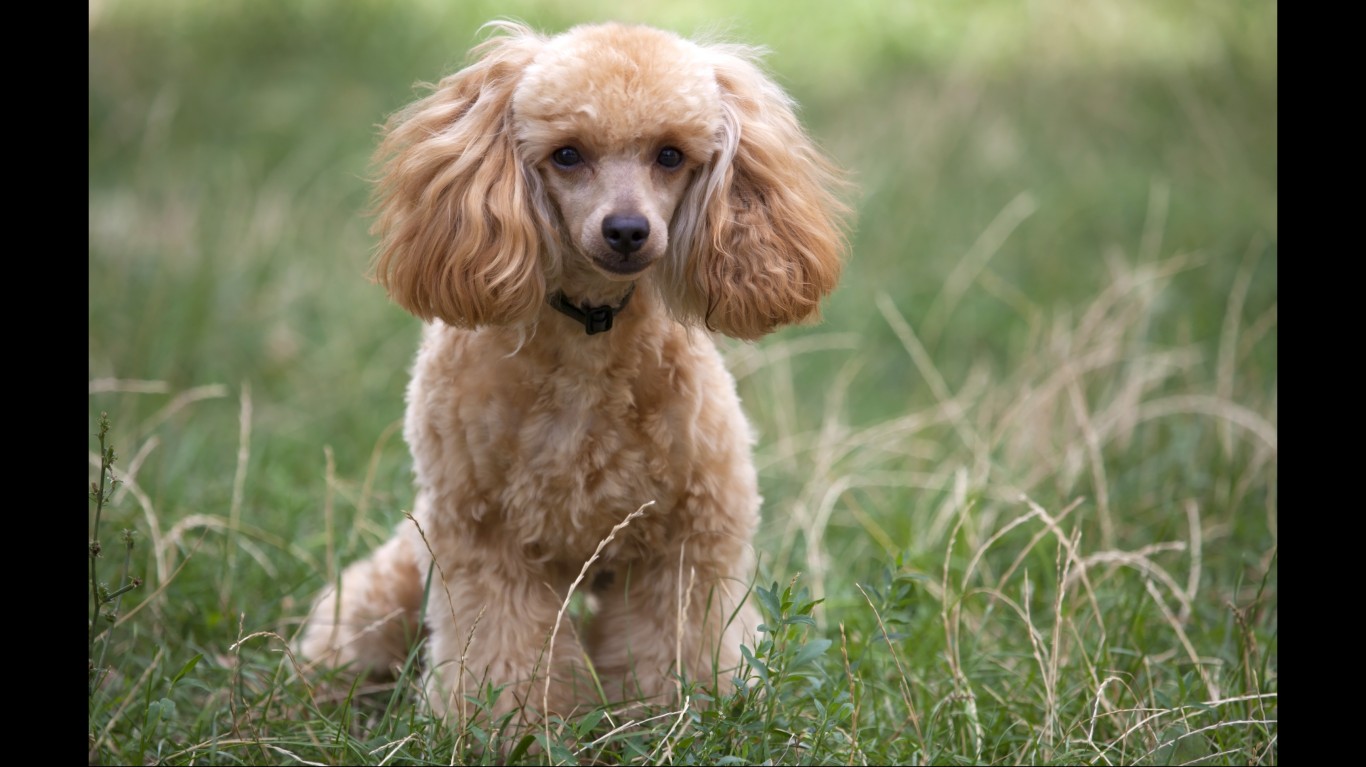
22. Poodle (Miniature)
> Size: 10-15 inches, 10-15 pounds
> Shedding: Little
> Good with kids?: Good
> Trainability: Easily trained
> Life expectancy: 10-18 years
Poodles come in three size varieties: standard, miniature and toy. The miniature is between 10 and 15 inches tall. Poodles are characterized by their curly hypoallergenic coats.
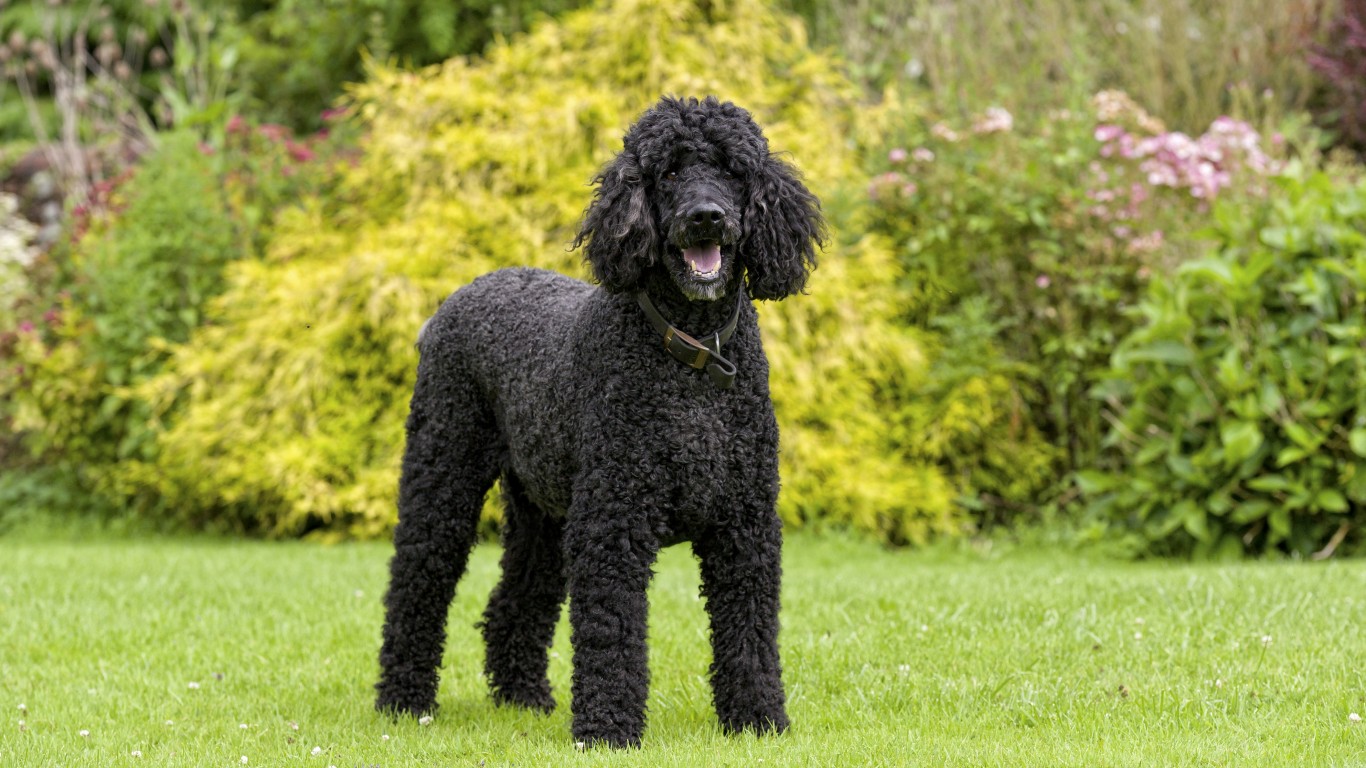
23. Poodle (Standard)
> Size: Over 15 inches, 60-70 pounds (male), 40-50 pounds (female)
> Shedding: Little
> Good with kids?: Good
> Trainability: Easily trained
> Life expectancy: 10-18 years
The standard poodle should be more than 15 inches tall at the shoulder. The poodle is the national dog of France, although there it’s known as the caniche, or “duck dog.”

24. Russian Tsvetnaya Bolonka
> Size: 9-10 inches, 4.5-11 pounds
> Shedding: Little
> Good with kids?: Supervision recommended
> Trainability: Early socialization required
> Life expectancy: 12-16 years
The Russian tsvetnaya bolonka, also known simply as the bolonka, is a member of the bichon family and almost went extinct until after the Cold War. The breed’s coat was developed in response to the scarcity of grooming products in Russia. It is hypoallergenic. Unfortunately, the bolonka does not get along well with other animals.
[in-text-ad-2]

25. Yorkshire Terrier
> Size: 7-8 inches, 7 pounds
> Shedding: Little
> Good with kids?: Good
> Trainability: Eager to please, should be socialized
> Life expectancy: 11-15 years
The Yorkshire terrier, or Yorkie, is a popular toy breed that grows up to a mere 7 pounds. It’s nicknamed “the tomboy toy.” It has a hypoallergenic coat that is more like human hair than animal fur, but it requires a lot of care and attention.
100 Million Americans Are Missing This Crucial Retirement Tool
The thought of burdening your family with a financial disaster is most Americans’ nightmare. However, recent studies show that over 100 million Americans still don’t have proper life insurance in the event they pass away.
Life insurance can bring peace of mind – ensuring your loved ones are safeguarded against unforeseen expenses and debts. With premiums often lower than expected and a variety of plans tailored to different life stages and health conditions, securing a policy is more accessible than ever.
A quick, no-obligation quote can provide valuable insight into what’s available and what might best suit your family’s needs. Life insurance is a simple step you can take today to help secure peace of mind for your loved ones tomorrow.
Click here to learn how to get a quote in just a few minutes.
Thank you for reading! Have some feedback for us?
Contact the 24/7 Wall St. editorial team.

